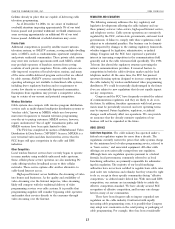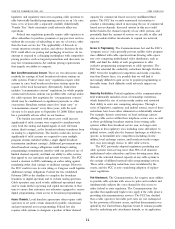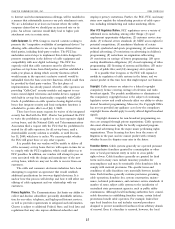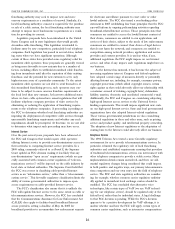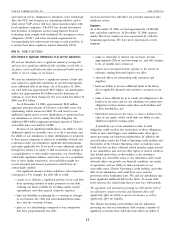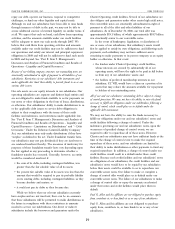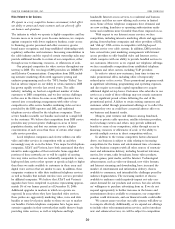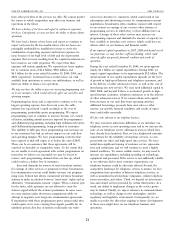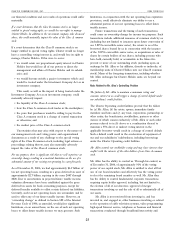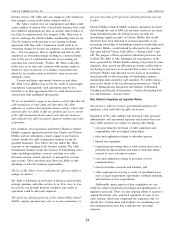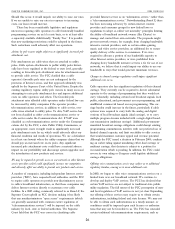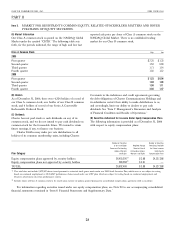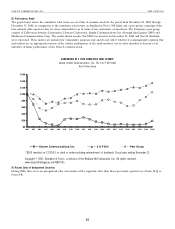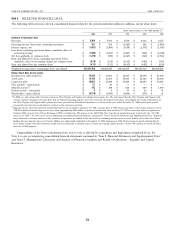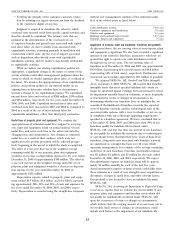Charter 2006 Annual Report Download - page 37
Download and view the complete annual report
Please find page 37 of the 2006 Charter annual report below. You can navigate through the pages in the report by either clicking on the pages listed below, or by using the keyword search tool below to find specific information within the annual report.
CHARTER COMMUNICATIONS, INC. 2006 FORM 10-K
our financial condition and our results of operations could suffer limitations, in conjunction with the net operating loss expiration
materially. provisions, could effectively eliminate our ability to use a
substantial portion of our net operating losses to offset future
If a court determines that the Class B common stock is no longer taxable income.
entitled to special voting rights, we would lose our rights to manage Future transactions and the timing of such transactions
Charter Holdco. In addition to the investment company risks discussed could cause an ownership change for income tax purposes. Such
above, this could materially impact the value of the Class A common transactions include additional issuances of common stock by us
stock. (including but not limited to issuances upon future conversion of
our 5.875% convertible senior notes), the return to us of the
If a court determines that the Class B common stock is no borrowed shares loaned by us in connection with the issuance
longer entitled to special voting rights, Charter would no longer of the 5.875% convertible senior notes, or acquisitions or sales of
have a controlling voting interest in, and would lose its right to shares by certain holders of our shares, including persons who
manage, Charter Holdco. If this were to occur: have held, currently hold, or accumulate in the future five
percent or more of our outstanding stock (including upon an
(we would retain our proportional equity interest in Charter
exchange by Mr. Allen or his affiliates, directly or indirectly, of
Holdco but would lose all of our powers to direct the
membership units of Charter Holdco into our Class B common
management and affairs of Charter Holdco and its subsidi-
stock). Many of the foregoing transactions, including whether
aries; and
Mr. Allen exchanges his Charter Holdco units, are beyond our
(we would become strictly a passive investment vehicle and control.
would be treated under the Investment Company Act as an
investment company. Risks Related to Mr. Allen’s Controlling Position
This result, as well as the impact of being treated under the The failure by Mr. Allen to maintain a minimum voting and
Investment Company Act as an investment company, could economic interest in us could trigger a change of control default under
materially adversely impact: our subsidiary’s credit facilities.
(the liquidity of the Class A common stock; The Charter Operating credit facilities provide that the failure
(how the Class A common stock trades in the marketplace; by (a) Mr. Allen, (b) his estate, spouse, immediate family
members and heirs and (c) any trust, corporation, partnership or
(the price that purchasers would be willing to pay for the
other entity, the beneficiaries, stockholders, partners or other
Class A common stock in a change of control transaction
owners of which consist exclusively of Mr. Allen or such other
or otherwise; and
persons referred to in (b) above or a combination thereof to
(the market price of the Class A common stock. maintain a 35% direct or indirect voting interest in the
Uncertainties that may arise with respect to the nature of applicable borrower would result in a change of control default.
our management role and voting power and organizational Such a default could result in the acceleration of repayment of
documents as a result of any challenge to the special voting our and our subsidiaries’ indebtedness, including borrowings
rights of the Class B common stock, including legal actions or under the Charter Operating credit facilities.
proceedings relating thereto, may also materially adversely
Mr. Allen controls our stockholder voting and may have interests that
impact the value of the Class A common stock.
conflict with the interests of the other holders of our Class A common
For tax purposes, there is significant risk that we will experience an stock.
ownership change resulting in a material limitation on the use of a
Mr. Allen has the ability to control us. Through his control, as
substantial amount of our existing net operating loss carryforwards.
of December 31, 2006, of approximately 91% of the voting
As of December 31, 2006, we had approximately $6.7 billion of power of our capital stock, Mr. Allen is entitled to elect all but
tax net operating losses, resulting in a gross deferred tax asset of one of our board members and effectively has the voting power
approximately $2.7 billion, expiring in the years 2007 through to elect the remaining board member as well. Mr. Allen thus
2026. Due to uncertainties in projected future taxable income, has the ability to control fundamental corporate transactions
valuation allowances have been established against the gross requiring equity holder approval, including, but not limited to,
deferred tax assets for book accounting purposes, except for the election of all of our directors, approval of merger
deferred benefits available to offset certain deferred tax liabilities. transactions involving us and the sale of all or substantially all of
Currently, such tax net operating losses can accumulate and be our assets.
used to offset any of our future taxable income. However, an Mr. Allen is not restricted from investing in, and has
‘‘ownership change’’ as defined in Section 382 of the Internal invested in, and engaged in, other businesses involving or related
Revenue Code of 1986, as amended, would place significant to the operation of cable television systems, video programming,
limitations, on an annual basis, on the use of such net operating high-speed Internet service, telephone or business and financial
losses to offset future taxable income we may generate. Such transactions conducted through broadband interactivity and
23


